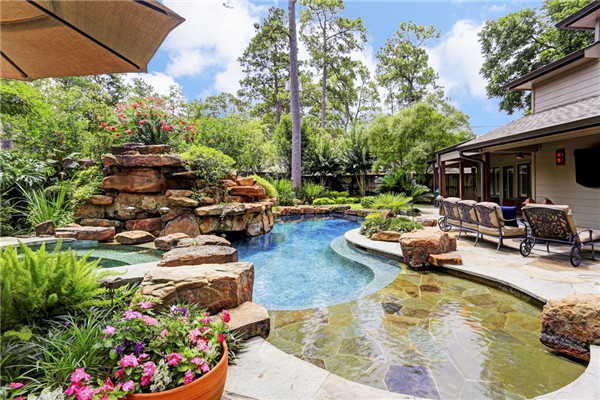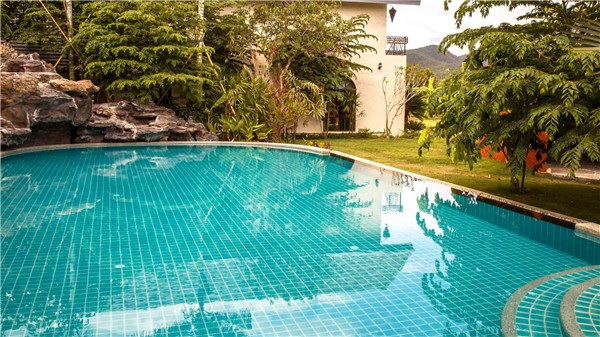Saltwater pool system has been gaining popularity these years. Many pool owners have a plan to join as a group member of saltwater pool owners for pure fun. It’s hard to imagine how unreasonable it is to make pool owners obsessed with a pool full of man-made chlorine additives, which gives off an acrid smell and could cause reddening skin and eye-stinging discomfort. Nowadays, most modern citizens are more or less allergy sufferers due to their fragile immune systems induced by worsening environment. They worry improper renewal on a swimming pool would do harm to their health, and afraid the loss outweighs the gain, so saltwater pool couldn’t be put on their construction board.

A new way of pure water transforming to saline water breaks the status quo. Instead of artificial chlorine additives, large amount of salt is added into the pool to produce natural chlorine with harmless minerals. There are many advantages to swim in this semi-natural saline pool water:
1. Maintenance Cost Saving
Saltwater pool can be less expensive to maintain over a long time, for natural salt is affordable everywhere, and salt cells have ability to produce chlorine as required. You just keep an eye on the chlorine level and make sure pumping system is well functioning.
2. Safer than Artificial Chlorine
Man-made chlorine can be dangerous to store and transport in liquid form. And there is an authoritative report saying that chlorinated water would incur risk of skin disease. Instead, salt is safe and harmless in daily use. Also, you would find out the water is not as salty as the sea, so it wouldn’t sting your eyes and nose, even if a accidental swallow wouldn’t disgust you.
3. Fairly Soft Feeling
Salt acts as a continuous source of chlorine. It makes water mild and silk-smoothing. The saline water is soft and warm and makes you feel relaxed as if swimming in a real beach. Most pool owners prefer this to the pungent smell of chlorinated water.

It’s believed pool owners who aspire to have his/her pool converted has a doubt: Does salt water erode tiles and grout? In fact, chlorine exists not only in saltwater pools but also in traditional pools. It’s just a matter of concentration. Although salt level is far more lower than the sea’s, it remains a challenge to the anti-corrosion performance of blue water pool mosaics. Following listed three issues for your reference on the selection of saltwater pool tiles and grout:
1. Select the Right Tiles
Usually speaking, natural stone/rock, travertine tile and mosaic are more easier to be discolored and aged than glass or porcelain tile if immersed in the salt water. Therefore, glass and porcelain pool tiles are highly recommended to be used in a saltwater pool. What’s more, to find a qualified swimming pool mosaic tiles suppliers is important. It ensures you premium-quality pool tiles with high performance.
2. Apply Chemical-resistant Grout
Since saltwater pools have higher concentration of chlorine than the traditional ones, chemical-resistant grout is necessary to be used. It’s better to have professional assist for a test and make sure the grout wouldn’t generate a chemical reaction, leading to unexpected imbalance of the pool water.
3. Maintain Chemical Balance of the Saltwater
Maintaining chemical in a proper pH balance is a basic part to improve longevity of the pool tiles. If the pool water is out of balance, it would increase the possibility of tile cracking and discoloring, which further arise the potential cost of pool tile resurfacing.
This article was very well received after posted. Here BluwhaleTile answers some questions from pool owners who sent emails to us and want to know more details on saltwater pool construction.
1. Do the water taste salty?
Most chlorine generators require salt content of 3000-4000ppm (parts per million). Ocean water has a salt content of around 35,000ppm. Most people won’t taste water salty as the salinity in the saltwater pool is close to that of the human skin, so you will feel comfortable when swimming in the water.
2. Will there be any salt residual?
Of course, for the salt is hard to dissolve completely in such a big pool. Use a long stick with a brush head, brush any place that has salt piled until it is fully dissolved.
3. Do I still need other chemicals?
The answer is absolutely. The saltwater system produces chlorine merely. To ensure your pool most beneficial to swimmers and facilities, chemical-balanced water is necessary. All factors like microbial quantity, pH and cyanuric acid will also need to be controlled at a proper level.
4. When do I need to add salt?
In short, salinity in the pool is stable except when water loses through evaporation, backwashing or leaking. Most saltwater pool owners need to replenish about 10% of their salt in each season.
5. What should I know about the maintenance of the system?
What’s most important, you need to maintain the salt concentration within the range of 3000-4000ppm so that the cell can have adequate amount of salt to generate chlorine that is sufficient to keep the pool running in a good state. Salt test items are universal and easily obtained at a local store of pool tools. Needed indexes will show on the panel of the salt content controller. The control knob may also have to be adjusted up and down to let chlorine production meet the demand. As the chlorine can only produce when the pump is running, you need to turn on the pump when the quantity of chlorine is below the recommended level. After some trials and faults, you will find out the several best timings that chlorine control system and filtration system coordinate well when different chlorine demand are required in swimming season. On the other hand, if the chlorine index shows below the needed standard, you may have to replenish chlorine in manual operation to improve the chlorine level quickly.
To learn more about what kind of pool tiles can be used in saltwater pool construction, welcome to visit pool tile professional BluwhaleTile at http://www.bluwhaletile.com/.